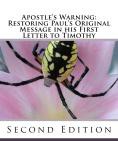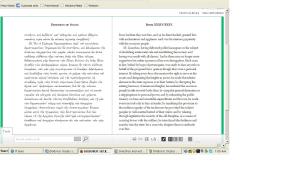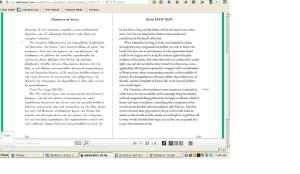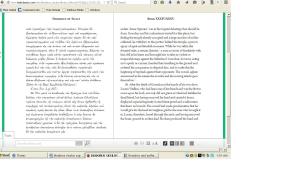A Preview of the Second Edition:
The apostle Paul’s first letter to Timothy is an urgent warning against a form of false teaching that was finding its way into the church community of Ephesus in Asia Minor.
Specifically, Paul warns against false teachers who devoted themselves to myths and endless genealogies (1 Timothy 1:3-4). They claimed to be teachers of the law, but did not know what they were talking about (1 Timothy 1:7). They taught a doctrine of asceticism that vilified the body and its passions; followers had to abstain from marriage and the eating of certain foods (1 Timothy 4:3). Paul refers to this teaching as demonic (1 Timothy 4:1), and he encourages Timothy to guard the gospel against opposing ideas that are falsely called “gnosis,” meaning knowledge (1 Timothy 6:20).
Paul also prohibits “a woman” from teaching or engaging in something he called “authentein” (αὐθεντεῖν) against “a man” (1 Timothy 2:12). Along with this prohibition, he makes reference to the salvation of women in childbirth (1 Timothy 2:15), and briefly reviews the story of humanity’s creation and fall into sin (1 Timothy 2:13-14).
Since Erasmus compiled his Greek/Latin Bible in the 16th century, “authentein” has been understood to mean “exercise authority.” In light of this translation, it appears as though the apostle does not permit “a woman to teach or exercise authority over a man.” Erasmus used the Latin expression “auctoritatum.” He used Jerome’s Latin Vulgate of the 4th century to aid his translation. Jerome translated “authentein” into the Latin “dominari.” This can mean “to dominate” or “to exercise dominion.” Erasmus’ Bible became the basis for the first English translations of 1 Timothy 2:12 as a prohibition against female authority. (Wilshire, 2010, pp. 76-77)
If we are to understand Paul’s letter correctly, I believe an important question must be asked: “Do these translations of Jerome and Erasmus reflect his originally intended meaning when he wrote to Timothy prohibiting authentein?” Frankly, I do not believe so. To help us understand what this word meant to the apostle Paul, I think it is helpful to examine the Scriptures he quoted from in his epistles; namely, the Greek Septuagint (c.f. Marlowe, 2012).
In the Septuagint, a noun form of “authentein” is used in following passage:
Do you remember the ancient inhabitants of your holy land? You scorned them for their unholy ways, for their sorcery and profane rituals, their callous killing of children, their cannibal feasts on human flesh and blood. They practiced secret rituals in which parents slaughtered their own defenseless children. (Wisdom of Solomon, 12:3-6, TIB)
The parents in this passage, who slaughter their children in profane rituals to false gods, are referred to as “authentas” (αὐθέντας).
A Greek historian from the second century B.C., named Polybius, also uses of a noun form of the word “authentein.” Whereas the Septuagint uses the plural “authentas,” Polybius uses the singular “authenten” (αὐθέντην). He does so in reference to a man named Cassander. In the following account, Cassander is found to be the one responsible for an event known as “the Massacre of Moronea”:
After a few days, when the Thracians had been got ready and introduced into the town at night by Cassander, a great massacre took place, and many of the citizens perished…. Philip was exceedingly taken aback by this, and after hesitating for long, said he would send Cassander, the author of the deed (αὐθέντην), as they said, in order that the senate might learn the truth from him. (Polybius; as cited in Walbank and Habicht, 2012, pp. 427-428)
In both the Septuagint and Polybius’ Histories, noun forms of the word “authentein” refer to those who perpetrate violent crimes against others. Similar uses of this word can be found throughout the Greek literature of the New Testament era. Writing in the first century B.C., Diodorus Siculus used the word on three separate occasions to mean: “perpetrators of sacrilege,” “author of crimes,” or “supporters of violent actions.” Writing in the 1st century A.D., Flavius Josephus used the term twice to mean: “perpetrator of a crime” and “perpetrators of a slaughter.” In the same period, Philo Judaeus used the term once to mean “being one’s own murderer” (Wilshire, 2010, p. 28). Writing in the 2nd century A.D., a Greek grammarian named Harpocration defined a form of this word as “a person who brings about the murder of someone through the use of others” (Wilshire, 2010, p. 23).
Why would Paul use such a typically violent word in his letter to Timothy? In thirty-two other instances of the New Testament, when Paul mentions “authority,” he uses the term “exousia.” He uses “authetein” only once (Trombley, 2003, p. 198). Were violent crimes or rituals being performed in or around Ephesus in the worship of false gods or goddesses, just as they were in the passage from the Wisdom of Solomon? Historically, the answer to this question is an unequivocal “yes”…
(End of preview.)
In the second edition of “Apostle’s Warning,” I share research from ancient Greek biblical manuscripts, Roman law, and historical documents written between the 2nd century B.C. and the 3rd century A.D.. All of these sources provide compelling evidence that Paul was not prohibiting women from “exercising authority.” Rather, it seems that he was urging Timothy to guard the gospel against the beliefs and practices of ascetic cults in Asia Minor. The mythology of these cults evidently influenced Judaism in the region, and then went on to provide the foundation for Gnosticism in the early church.
The new book is available at the following link:
http://www.amazon.com/Apostles-Warning-Restoring-Original-Message-ebook/dp/B01BT8AAJ2/ref=sr_1_1?ie=UTF8&qid=1455574890&sr=8-1&keywords=Apostle%27s+Warning+Second+Edition



